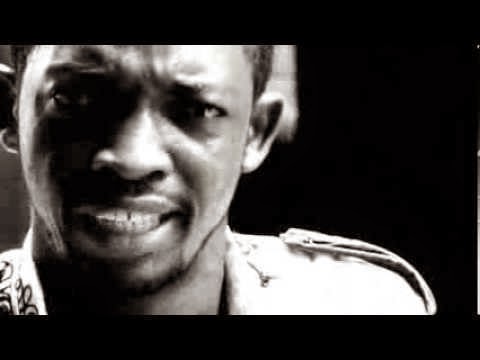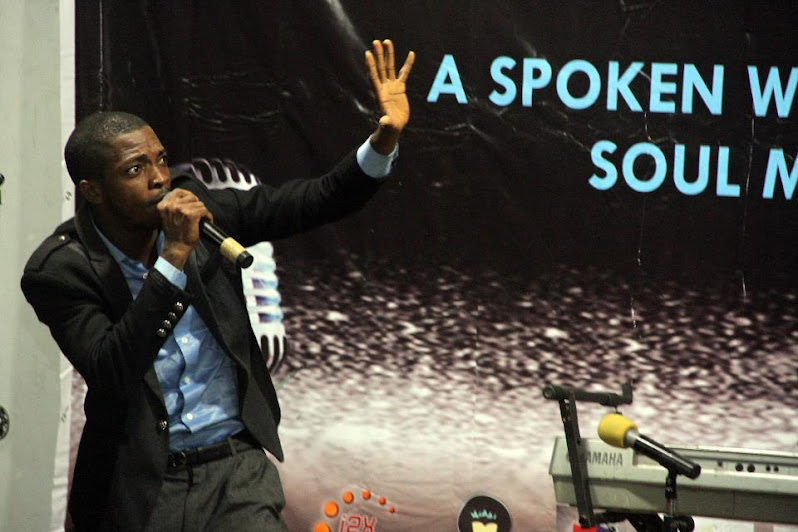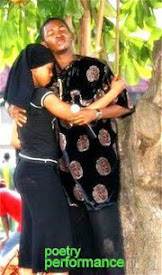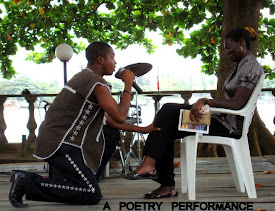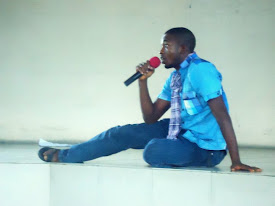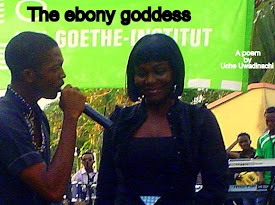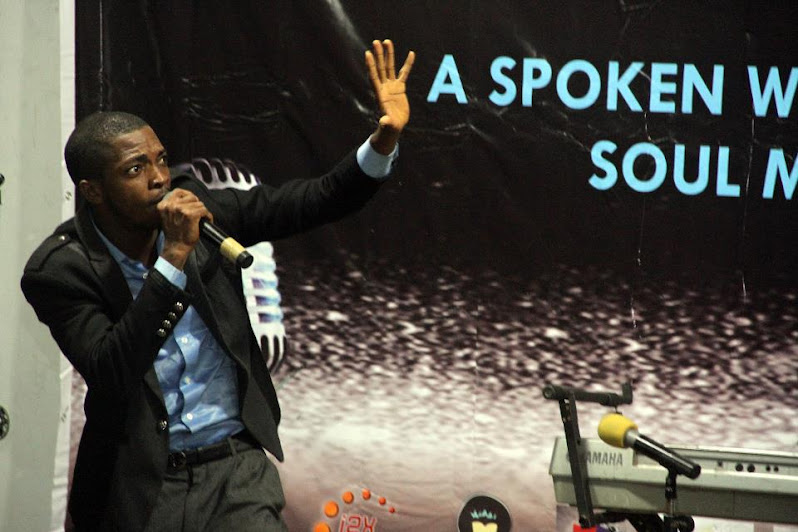BY CHAMPION NEWSPAPER
WHY SLUMS OFTEN PRODUCE RARE TALENTS
-Uwadinachi, Nigeria’s priest of poetry
Multi-talented
Uche Uwadinachi, one of Nigeria most creative young poets, and author
of the book scar in the heart of pain, is regarded in Nigerian’s
literary circle as the priest of poetry, due to his penchant for
performance poetry and the deep spiritual tone of most of his works. In
an exclusive interview with DAVISON NJOKU,
this key player in an exciting new generation of hip hop movement and
whose poem was recently shortlisted among the best ten Korean-Nigerian
Poetry Fiesta 2012, opened up on a variety of interesting issues.
Excerpt.
Childhood
My
mum played the role of a nurse, and a counselor. She was always there
to shape and reshape the idea I had about life then, and kept on pushing
to me motivational books. This facilitated my quick recovery and the
making of my first publication “SCAR in the HEART of pain”.
Environment
Hmmm,
I am privileged to be born and raised in Ajegunle, however, this was
the biggest challenge I had to face as a child growing up to learn the
reality of life. It was a whole clash of contradictions. Ajegunle, the
most popular slum, is a factory of the good, the bad and the ugly. Life
there guarantees you what you bargain for without any re- negotiation.
AJ
the jungle city is not just characterized with the usual songs of slums
as in poverty, illiteracy, juvenile violence, unemployment, child
abuse, hooliganism, Indian herm addiction etc, it is a home, a center
for unusual skill acquisition , talent discovery and creativity. Thus
like you have a tattered child in the street begging for alms, so also
you see another child-tailor dressed in self made Ankara attire, helping the mother to sell Akara (bean cake) at bus stop .
I
started on the negative side, seeing so many barriers and curse in the
menial income of my parents and everybody around. Really, the fees were
not there for school, textbooks, and medicals, so like other kids,
coupled with the blunt fact that the only things I see were pocket
crimes around, mass cases of unemployment, decayed local road projects,
contaminated pipe borne water systems, I saw nothing but living in
extinction from a normal life.
These
to me are scars to the life of the ghetto child- a crux of urban
poverty in the new millennium. An innocent child denied of his/her right
to basic amenities in the name of structural mismanagements. These were
the sad testimonies in my book ‘SCAR in the HEART of pain’ captured in
‘Curse.’ The second and third phase ‘Cure’ and ‘Course’ however,
pictures my survival and conquest in the profound statements of every
other youth that has defeated these huge societal and psychological
predators.
Peers
Peers
are no less products of the existing social calamities. They are forms
of what they are in the environment where they find themselves born or
raised. They only struggle to tear it out one way or the other. My state
of mind and health did not help me then in directly associating with
peers which equally would not have helped less or worse to my
development. Though all I saw in them from the distance I always
observed, was the same predicament, however I encountered and discovered
my remedy, myself. This thus made me stronger than any peers could have
had on me. On my teenage bed, I discovered that the same writing which I
secretly used to paint my pains on papers turned out to be the therapy
to my long grief. I became a priest to my maladies. Writing poetry
peered me all along through those process of healing to the last page of
my book.
Motivation
Ajegunle
is my story, my motivation. As long as I kept seeing those
contradictions, those humiliation and oppression, I get motivated by the
fact that a good standard of living is still possible for the ghetto
child, only if he/she struggles and for it. To be born in the street is
not the fault of any child and should not be justified as his /her
responsibility under the excuse of moral obligation.
From
the very first day, I discovered a pen could write, and express one’s
feeling on a paper, that was the day I discovered my closest and deepest
motivation. Writing poetry was a therapy I realized could motivate
anybody, any day. The unique thing about this kind of solution is that
like any analgesic, it kills that pressure in you and reactivate your
brain cells to work actively again.
The
poetry book I first encountered, that really influenced me, was ‘Season
of Struggle’ by Aj. Dagga Tolar - a collection damning all forms of
societal predatorship under the disguise of the people’s leadership.
It was a book to learn that no child is guilty of poverty. Later in
life, I caught a big fish, I found a deity of my best inspiration, in
respect to using poetry to manage life’s best stories. He is Niyi
Osundare – the grand priest of poetry. He was my menthol in how to write
accessible poetry.
I
must confess that the small poetry contest awards here and there, are
indispensably encouraging to me, to write more and become a better poet.
Starting with the ANA (LAPOFEST)poetry prize for 2006, June PoetryCraze
award 2009, 2nd prize Ken Saro-Wiwa contest award USA
2010, June Loudthots prize 2011, Korea-Nigeria Poetry feast top-ten
award 2012, then owning the credit as the director of the winning poetry
performances of District 5 Educational Board-Jam Feast 2011 and overall
winner of the GT-Bank National Art Festival (P.L.A.Y) - Alakoto Senior
High School, 2011, I cannot but say that I have been greatly inspired to
change my world . So a big thanks to you all who have given me those
honours, they may not be large cash but they are costly symbols to me
and to every growing child in AJ.
Dreams for the future
My
foremost wish is to see my other publications and spoken word Cds out
in public shelves, been read, heard, watched and reviewed, and not to be
stocked for ages in libraries that now functions like museums. I plan
to raise a house of poetry in Ajegunle with two departments- an ultra
modern library and a theatre devoted to performance poetry. There the
young and old can search and experiment their taste and charms of the
genre. I also look forward to carry out vocational trainings in several
skills acquisitions with possible access to the equipment to start their
own businesses with. I also want to start a campaign for the use of the
Pidgin Language as a subject in our schools. Pidgin is the last left
breed of our dying indigenous languages. The hybrid of everything
Nigerian, that must be respected, preserved and developed. The Nigerian
pidgin is a statement of our history, ways, lifestyle, strength,
experience and the future. And I believe this it is not just a dream, it
is the future.












